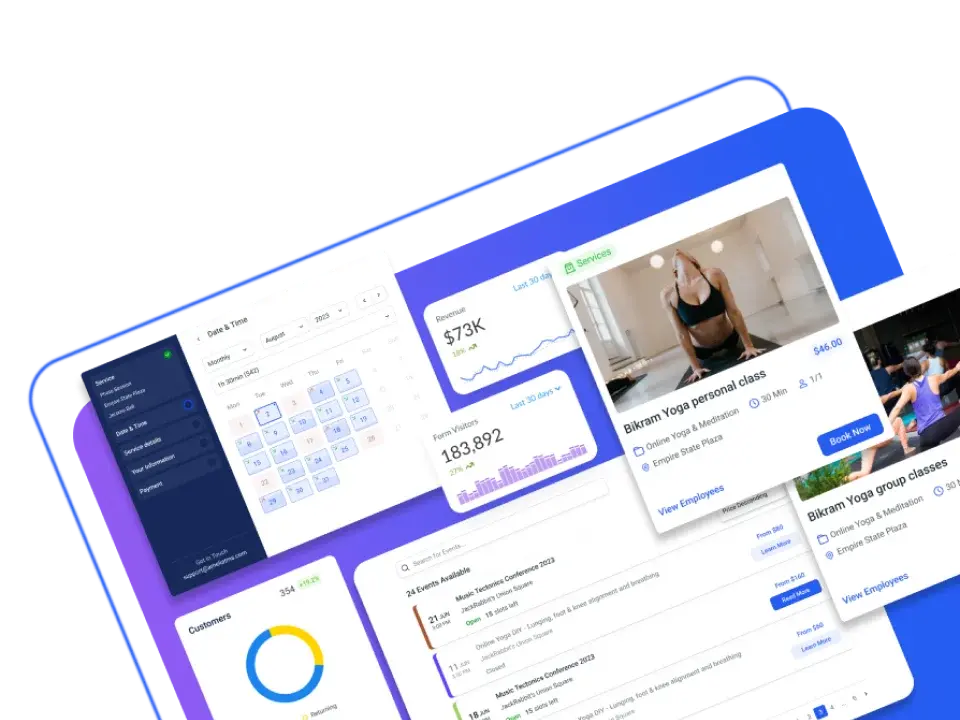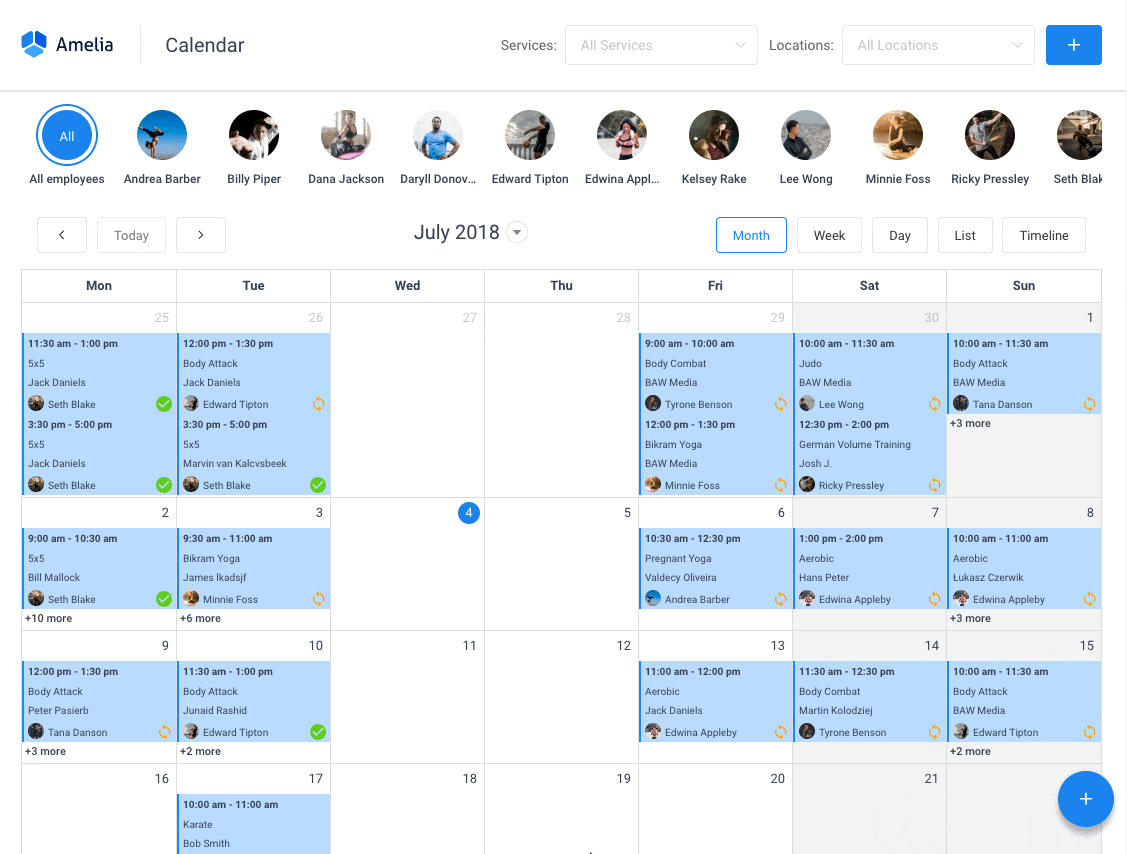The digital revolution has forever changed conferences. What once was a week-long planning project can now be done the same day online. While some people may miss the old days, many benefits such as greater accessibility, brand awareness, and higher attendance make it clear that virtual industry events aren’t going anywhere.
They should be high quality, but how can companies get better at hosting successful virtual events? The first step to improving is learning virtual event best practices, and then finding ways to implement them.
In this article, we will explore how to host a virtual event that keeps guests engaged and interested.
Virtual Event Best Practices
Decide the Type of Event You’re Planning to Host
The most important choice you have to make is what type of event to host before you even start with the virtual event best practices. Are you planning a virtual career fair? A virtual trade expo? An online sporting event? Do you want to plan a more professional virtual conference? Or perhaps you would prefer a smaller-scale webinar?
No matter what type of business you run, there are many different styles of virtual events available. Deciding which to use depends on what you want to come from that event. You need to establish clear expectations, objectives, and timelines to be able to choose the right online event for you.
Perform Lead Generation Early
An online event is useless if no one attends. Lead generation is a necessary step to let people know about your first virtual event. There are multiple avenues for this, such as press releases, blogs, email marketing, social gatherings and using social media networks like Facebook or LinkedIn to gather leads and extract relevant databases. You might also explore the use of a LinkedIn data scraper to efficiently gather valuable data
Which you use depends on your target customer base and where you will have the most success. If you are a SaaS business planning to hold a virtual event but unsure which lead generation tactics to use, consider working with a SaaS lead gen agency.
Choose the Right Virtual Event Platforms for Your Virtual Event
Just like choosing a location, you need to choose the best place to reach your audience. In this case, this means choosing the best virtual event platform for you. There are lots of platforms, and you need to choose which works best for both you and your attendees.
Try researching features or pricing options to help choose which is best. You can also learn what other event organizers use, and ask why they use that platform.
Sell more event tickets with the right tool for the job
Staying organized has never been easier.
You can now manage your business and grow your brand with a single, powerful WordPress booking plugin that keeps all of your appointments or event bookings in line, your clients organized and your business booming.
Amelia is the perfect events plugin for business owners who need to streamline their booking experience both for their staff and their clients.
Amelia handles everything for you, even sending automated email or SMS reminders to your clients. No-shows? Not anymore!
The Amelia WordPress booking plugin adapts to different industries for a blissful online booking experience and employee management.
Want to know more? Check out Amelia’s awesome features to see what you are missing.
Bring Value, Not Pitches
This may seem superfluous; perhaps you’re thinking, “Well, if they buy my product, they will get value,” but your clients may not feel the same way.
This can especially be important if you told event attendees that there would be no strings attached to your event.
Instead of making pitches, try to deliver value by filling your sessions with interviews, master class series, expert speakers, and other content. You can leave your pitches to the digital marketing team and focus on providing valuable content.
Do not Skimp on Production Quality
Time is the most valuable resource that we can use, as it is the only resource we can’t get more of. Don’t expect people to trade their time for a mediocre experience. Audience participation and engagement tools can both help, but production quality is often the defining factor.
You need top-notch speakers as well as interesting topics to be able to stand out in the crowd. Your organizers need to engage and listen to the audience. You can listen by using plenty of polls or surveys. We are all learning, and we all want to create an overall better virtual event experience.
Record Sessions and Make Them Available After the Event
At a virtual event, everything can and should be recorded. If you don’t record your virtual events, then you are missing out on a great form of revenue. You can place your recorded sessions online for attendees who missed the event, or you can publish them on your demand generation strategies.
You can use these recorded sessions as leverage. Did you recently have a popular session? Use that session as a webinar after the virtual event to find a whole new set of prospective clients. You can even think about repurposing these events for infographics, blogs, or eBooks that can engage with clients on a whole different level.
Create a Human Experience in a Virtual World
The core of any event is “The Human Experience,” which just means keeping it real. Let the audience see a good conversation, no matter what the subject matter is. This increases attendee focus while staying sensitive to the global environment that your event attendees see every day.
The virtual environment can also come with some key features to help improve “keeping it real.”
As an example, online events can connect attendees using group chats. They can even collaborate in real time, which can further engage attendees.
Market Your Virtual Conference
People can’t come to an event that they don’t know about! Make sure to give yourself lots of time to promote your event.
A good general rule is to allow yourself three months of promotional time, giving monthly notices before the event. Then, as it gets closer, you can switch to weekly or daily notices for your social media audience. Social media can be a fast way to both promote your event and see how much buzz you’re creating as a result.
To get the most out of your social media campaigns, make sure to use a social media moderation tool to effectively monitor and manage content, ensure brand consistency, and maintain a positive online presence on different platforms.
All you need is to create quality content about your virtual conference and know when to post on LinkedIn and other platforms for maximum visibility and engagement.
Invest in Swag for Attendees
Corporate gifts, company swag, and other types of offerings can be a great way to engage attendees. Everyone likes getting free stuff, so try to get gifts that will go far with your target market. As an example, if you are talking to prospects, then swag gear may be the way to go. If you have a Millennial to Gen Z audience, get Pokémon Cards and watch their surprised joy.
You can even offer these gifts as prizes for those who engage in the event. A couple of example winners could be those who answer questions, provide feedback, join chat rooms, etc.
Technology Can Make or Break Your Virtual Conference
Technology is the wave of the future, and sometimes you have to ride it or be swept away. When looking for a tech platform, partner, or solution, don’t stop at one. Use more tech to make the best virtual event platform for your attendees, and give them the best virtual event experience possible.
Choosing the right platform and tech can be like cooking a meal. You can just buy a refrigerated meal from the store and give that to the company, but they may not be satisfied in the end. If, on the other hand, you buy multiple ingredients to cook the meal, your guests will have full stomachs when they go home. In the same way, there is no perfect one-stop-shop tech for running a virtual event.
Include Moderators at Your Event
Be ready for things to get out of control; people are often not as polite online as offline.
To be ready, make sure to have plenty of moderators on hand to mute or ban virtual event attendees in case of the worst.
Prepare Attendees for the Event
Don’t assume too much about your event guests; not everyone is tech-savvy. Make sure to prepare attendees to help them get the most out of your event.
Offer tech support for certain tool features, like vendors, rooms, virtual booths, and how to connect attendees.
Hire a Professional Emcee
One of the things that virtual events often miss is the opportunity to connect sessions, keynotes, and networking events all together without feeling disjointed. The solution? A professional emcee. When you hire someone to give announcements, lead Q&A sessions, and both start and end sessions, it will help infuse fun into the conference.
When looking for an emcee, it can be important to think about the tone you want for your event. Do you want serious or silly? Your emcee will be the face of the event, so choose someone that will represent your event best.
Use Virtual Features to Their Full Potential
Using the unique features that come with virtual events, plan to start engaging attendees tenfold. Think about the options you have available: tools to help attendee networking, live Q&As, one-on-one video calls, breakout sessions, as well as reaction buttons such as clapping or raising a hand.
All of these virtual features can help keep attendees involved in the event, which leads to better engagement. What’s more, you can even track the information to see what interests your audience and what they like best in your events.
Find Unique Ways to Engage Attendees
Give your virtual event attendees an interactive and engaging experience, and it will be a successful virtual event.
Whether you help people engage through social media (for example, through asking questions with specific hashtags) or by messages on your virtual event, be ready to respond quickly to keep people invested and excited.
Have a Plan or an Agenda Prepared
Making a virtual event without a solid plan in advance can be a setup for failure. Structure helps keep your guests engaged and keeps the meeting on time.
You can even share the agenda with attendees during event planning so they know what to expect. It also helps keep your speakers prepared for their time slot, therefore keeping the meeting smooth. Even if you post your event outline on Twitter by scheduling them with a schedule tweets feature, will give you a better engagement on your events.
Set a Realistic Timeline
Choose a time or date when people in your community can attend. Luckily, you don’t have to worry about the location as you do in-person events, but you do have an entirely different problem. Because your attendees can come from anywhere, you will need to consider time zones as well.
In an ideal world, planning to host a virtual event takes about eight-ten weeks, but don’t let that fool you.
Problems happen, and if you lose a week due to an issue during development, you may be stuck. Instead, try to book your event far in advance to let your marketing team time to work, as well as your event organizers to build it up to perfection.
Showcase Your Sponsors
Make sure your sponsors have a dedicated area to showcase themselves, just like an in-person event.
This can be done in several ways, such as displaying content, logos, or even a branded virtual waiting room. This can help develop the same impact as an in-person event, and at times will be even more interesting.
Track Engagement
You can take advantage of the benefits of online events after the effect in totally different ways than in-person events. As an example, for in-person events, it can often be difficult to tell when attendees are losing interest, especially after the physical event.
Using whatever tracking capabilities you have available to you (depending on which virtual event platform you’re using), you can tell exactly when attendees stopped participating, or when they started to leave.
You also can use social media to see when the buzz starts to die down. When do Tweets or messages start to slow down? What parts of the virtual event had the highest or lowest viewership? Which pages or pieces of content were selected the most? Using this information, you can start to improve for future events held online.
Gamify Your Event
You can help incentivize some parts of your virtual event by gamifying some of it. Both scavenger hunts and leaderboards help increase the time your audience participates and increase the lasting impression you will make on their minds. This can eventually prove to help the number of leads you get on mobile event apps or your website.
Send Out a Post-Event Follow-Up
You can follow up on events by sending a simple “Thank You,” or send recordings, additional content, readings, invitations to other networking events, etc.
You want to leave your attendees with a positive feeling about their experience.
FAQ about virtual event best practices
1. How can I ensure that my virtual event is engaging and interactive for attendees?
Consider adding interactive features like polls, Q&A sessions, breakout rooms, and gamification to make sure guests of your virtual event are engaged and interactive.
Additionally, give attendees the opportunity to participate actively by giving them clear instructions and a platform to express their ideas.
2. What are some effective ways to promote my virtual event and attract a larger audience?
Consider using social media platforms, email marketing campaigns, influencer marketing, and paid advertising to publicize your virtual event and draw in more attendees. Use your connections and partnerships to spread the news about the event and motivate people to tell their contacts about it.
3. How can I create a compelling agenda for my virtual event?
Consider the wants and needs of your target audience when creating a compelling agenda for your virtual event, and make sure it is in line with the main aims and objectives of the event.
To keep guests interested during the event, be sure to include a variety of speakers and subjects, and think about including interactive components.
4. What are the best practices for managing virtual event logistics, such as audio and video quality?
Consider running a test run prior to the event to make sure that all technological parts are in working condition in order to manage virtual event logistics successfully.
Additionally, provide guests with detailed directions on how to join the event, what supplies they’ll need, and how to resolve any potential technical difficulties.
5. How can I facilitate networking and relationship-building among attendees in a virtual event?
Consider including networking sessions, breakout spaces, and virtual lounges where attendees can mingle and converse informally to promote networking and relationship-building among attendees at virtual events.
Consider supplying resources and tools so that attendees can communicate with one another outside of the event as well.
6. What are some effective ways to measure the success of my virtual event?
Consider tracking metrics such as attendance, engagement, and participant feedback to evaluate the performance of your virtual event. Measure the event’s effect on your company’s goals and objectives as well, such as lead generation or brand awareness.
7. How can I create a sense of community among virtual event attendees?
Consider including opportunities for guests to connect with one another and participate in shared experiences to foster a sense of community among those attending a virtual event.
Additionally, think about giving participants tools and resources so they can keep in touch and talk after the event.
8. What are some ways to incorporate gamification into a virtual event to increase engagement?
Consider adding components like leaderboards, point systems, and challenges that motivate participants to actively participate and engage with the content to gamify a virtual event.
Consider rewarding participants who participate and engage the most with incentives or rewards as well.
9. How can I keep attendees engaged during breaks and downtime in a virtual event?
In a virtual event, think about offering entertainment to guests during breaks and downtime, such as music or films, or holding casual talks or virtual networking sessions.
Consider including wellness or mindfulness breaks as well to aid guests in recharging and refocusing.
10. What are some strategies for keeping virtual event attendees focused and productive throughout the event?
Consider breaking up larger sessions into small, more digestible segments and including interactive components like polls, quizzes, and Q&A sessions to keep virtual event attendees engaged and productive throughout the event.
Additionally, think about giving participants clear goals and takeaways for every session and using engagement tools to keep them focused.
Can You Implement These Virtual Event Best Practices Into Your Business?
Many people fear the idea of running virtual events, but hosting virtual events can prove to be a lifesaver for many companies.
Using the virtual event best practices, you have the building blocks of a great event. Just remember, always put yourself in your attendee’s shoes. Think about what they want to get out of your event, and then think about the needs of your sponsors, exhibitors, and organization.
If you enjoyed reading this article on virtual event best practices, you should check out this one with virtual event survey questions.
We also wrote about similar topics like adding a virtual events calendar to your site, how to add a calendar to WordPress, using an event WordPress theme, virtual events checklist, and the types of virtual events you can organize.


